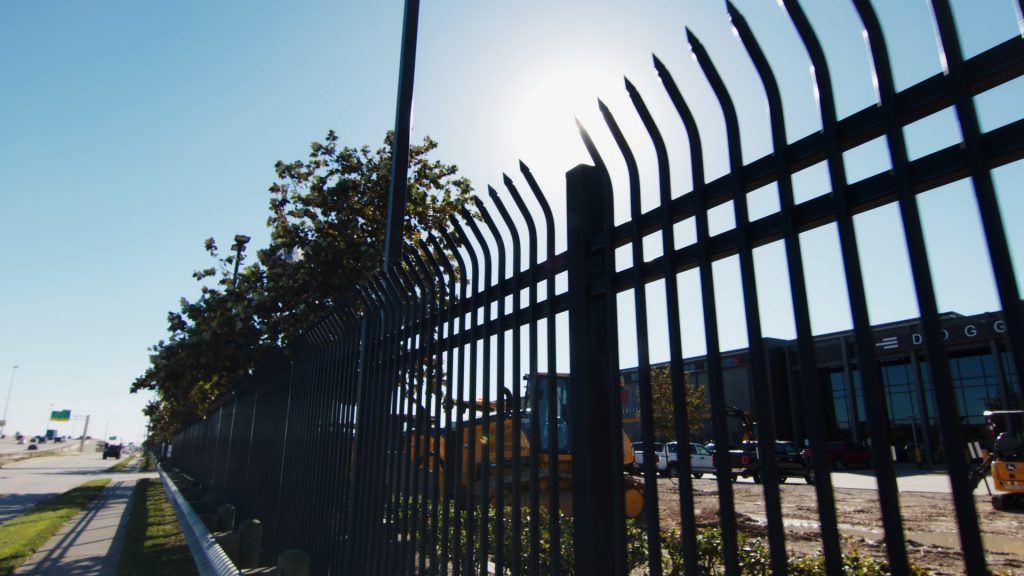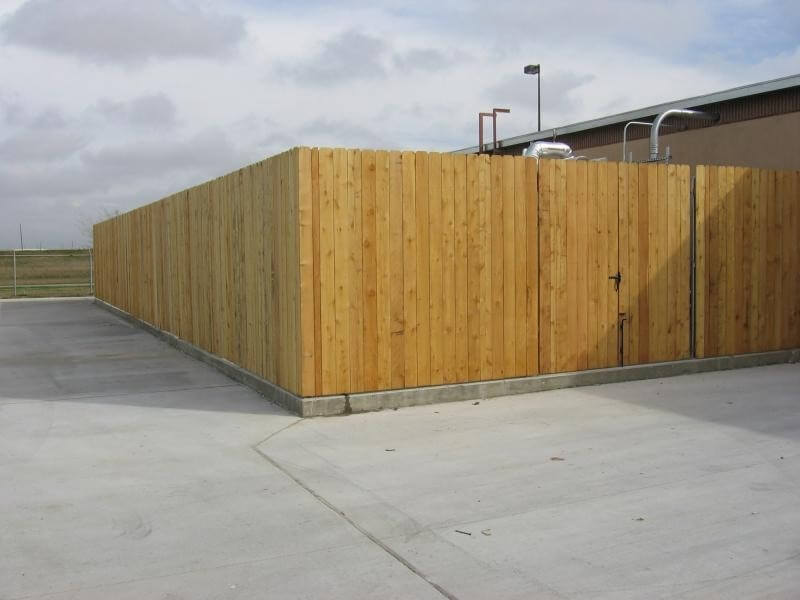Types of Commercial Fences
Different Types of Commercial Fences

So you’ve decided to invest in a new commercial fence for your business space, but now you’re faced with the challenge of picking the type of fence that’s just right for you. With the myriad of commercial fencing options that you’ll find on the market — from chain link to vinyl to steel — it’s almost overwhelming. Don’t despair – we’ve got you covered with a comprehensive guide to the different types of commercial fences.
In this post, we’ll walk you through the various types of commercial fences and their respective benefits, so that you can make an informed decision when it comes to purchasing a new commercial fence. From aesthetic to structural, we’ll discuss the qualities of each type of fence and how they can improve your business space. We’ll also go through the installation process as well as safety considerations that you should keep in mind. Let’s get right to it!
There are several different types of commercial fencing available, including chain link, metal, wood, and vinyl. Each type has its own advantages and disadvantages, so it’s important to consider your needs before making a decision.
Different Types of Commercial Fence Materials
The type of material you select for your commercial fence will depend on a range of factors, including the environment and landscape in which it will be situated, its purpose and security needs, and your budget. There are a variety of materials from which to choose, including wood, vinyl, aluminum, and steel. Each has its own advantages and drawbacks, making it essential to weigh these carefully when making a decision.
Wood is one of the most popular fencing materials on the market due to its aesthetic appeal and ability to fit into almost any landscape. It is also affordable and highly customizable; however, it does require maintenance due to its porous nature which makes it vulnerable to moisture and insects. Additionally, it can rot or warp over time if not properly treated or maintained.
Vinyl fencing is also both attractive and durable. It is cost effective and offers exceptional protection against weather and rusting. However, vinyl can become brittle over time, particularly in colder climates, making it susceptible to breakage or damage if not correctly installed.
Aluminum fencing is another popular option as it is low maintenance, lightweight and affordable. However, it can be difficult to shape around uneven surfaces, such as hilly landscapes or curves in the terrain.
Steel fencing is the most secure type of fencing available thanks to its strength and durability. Steel is also one of the longest lasting options available; however, it can be more expensive than other materials due to its complexity in installation.
When selecting a material for your commercial fence installation, consider your budget as well as what kind of environment the fence will need to work best in as different materials will have varying levels of success in certain climates or environments.
.
- According to recent research, the most popular type of commercial fence is chain-link fencing, accounting for almost 50% of all commercial fences sold.
- Privacy and security fences account for an additional 25% of all commercial fence purchases.
- Ornamental and decorative aluminum fencing account for just under 15% of all commercial fence sales.
Steel Fencing
Steel fencing has become an increasingly popular cheap option for businesses and homeowners alike due to its relatively low cost and durability. Steel is an incredibly strong material, and it’s resistant to most wear and tear, making it ideal for businesses that need a secure perimeter or homeowners who want to add some extra protection around their properties. While steel can be quite difficult to install, professional fence installers are typically able to get the job done within a few hours.
However, some argue that steel fencing is not as attractive as other commercial fencing materials, such as aluminum or vinyl. Additionally, exposed steel fencing may rust over time if exposed to harsh weather elements, potentially requiring repainting or additional upkeep throughout the life of the fence. Despite these drawbacks however, steel fencing offers a durable and affordable solution for many businesses and homeowners looking to protect their space.
Steel fencing is a popular, inexpensive option for businesses and homeowners due to its durability and relatively low cost. It can be difficult to install, but professional fence installers can usually complete the job quickly. However, it may not be aesthetically pleasing compared to other commercial fencing materials and may require repainting or additional maintenance if exposed to harsh weather elements. Despite its drawbacks, steel fencing is still considered a viable solution for many looking for an affordable solution to protecting their property.
Aluminum Fencing
Aluminum fencing offers a durable and attractive option that can provide both aesthetic value and boundary definition to commercial properties. With its resistance to rust and low-maintenance requirements, aluminum fencing is ideal for those who desire the look of wrought iron without the high expense or maintenance of traditional metal fencing. Aluminum also boasts a variety of colors and styles, making it easy to find an option that fits your unique needs.
On the other hand, aluminum does have drawbacks when used for commercial fencing applications. For example, the cost of aluminum fencing compared to other types of fencing can be expensive for large scale projects due to its weight. The lightweight nature of aluminum also means that it is not as strong as many other types of fences, making it ineffective against higher security needs. Additionally, due to aluminum’s softness, panels can warp if installed improperly or with too much force; therefore careful installation is necessary to avoid this issue.
Despite these drawbacks, aluminum fencing still offers an attractive and enduring solution for many commercial fencing needs. It is important to carefully weigh the pros and cons when deciding whether or not this type of fence is right for you.
Vinyl Fencing
Vinyl fencing is a popular choice in today’s market with its long-lasting, durable, and low maintenance qualities that appeal to many commercial properties. Vinyl also offers a lot of flexibility as it comes in many colors and styles, allowing for customization to fit each individual project. While vinyl is often more expensive up front than other materials such as wood or chain link, over time the longevity of this material makes it cost efficient.
Expense aside, vinyl has the potential to last much longer than the alternative materials since it is weather resistant. Vinyl requires little upkeep to maintain its initial attributes such as its color and structural integrity. It will resist fading from UV exposure and need very little cleaning and repair compared to other materials.
Debate: Vinyl does pose some potential problems for property owners as well. Its lack of flexibility means that it can become brittle during extreme temperature changes in hot climates which could cause cracking or splitting on impact. Repairs can be difficult because matching the right color may prove to be difficult or impossible depending on when the vinyl was originally manufactured and installed.
Overall, while Vinyl fencing certainly has its drawbacks, these should not be seen as too detrimental to property owners considering all of the advantages that this material offers compared to other options on the market. With proper consideration and installation practices, Vinyl fences have been considered an extremely attractive way to secure a commercial property.

Wood Fencing
Wood fencing is a classic type of commercial fencing due to its timeless visual appeal and highly durable build quality. The wood’s natural characteristics help protect it in the long run against things like pests, rot, and warping. It can be used for a variety of structures, from tall privacy fences to lower picket fences, making it a great choice for an array of commercial applications.
The biggest disadvantage for wooden fencing is the relatively high cost. When you factor in building permits, materials, labor costs, and other incidental charges, it can be an expensive investment which could potentially be less expensive with other types of fencing materials. As well, since most wooden fences require maintenance over time to maintain their appearance and structural integrity, this may add further cost to the business owner.
On the other hand, there are many advantages to using wooden fencing for commercial properties. To begin with, wood provides a secure and reliable barrier that will last for decades with proper maintenance. Also, compared to other types of fencing options, wood is much more aesthetically pleasing and helps boost curb appeal while adding value to your property. Furthermore, wood is also easy to work with and can easily be customized to fit any design or style needed.
Ultimately, while there are both advantages and disadvantages to consider when installing wood fencing on a commercial property, the beauty and strength of wood makes it an attractive option depending on your budget and purpose.
Chain Link Fencing
Chain link fencing is a popular and often economical option for business owners when it comes to security and safety. Chain link fences are built with galvanized steel, which offers a durable protection that can withstand the elements. The look of chain link fences are made up of linked wires woven together into a diamond pattern that creates a mesh-like barrier. The mesh might be woven with thicker material to increase the security levels. In terms of properties, chain link fences offer corrosion resistance, strength, visibility, flexibility and affordability.
On the one hand, chain link fencing can be easily manipulated to fit the application while keeping costs down. It’s great for providing protection from animals or deterring potential burglars from entering your property. On the other hand, some might argue that chain link fencing is an ugly solution for commercial properties and can detract from the aesthetic value of the area.
No matter what side of the fence you are on regarding chain link fencing for your property, it is important to consider design, function and installation processes to get the most out of your purchase.
Design, Function and Installation Considerations
When selecting a commercial fence, it is important to consider the design, function and installation considerations carefully. The unique aesthetic of each style will determine the overall look of your property as well as how effective the fence is in terms of security and durability. Different fencing materials have various levels of resistance to hazards such as dust, wind, moisture, dirt, and UV radiation over time which affects the longevity of the fence. Additionally, installation influences the total cost of the project due to labor costs and any additional features like gates or posts. As with all projects, a careful budget that takes into consideration these factors should be created prior to beginning installation.
Regarding function, some fences may be designed to give customers or visitors access solely to certain parts of a business’s property while keeping other areas hidden or providing limited access. Additionally, fences can provide privacy while still allowing visibility through certain types such as chain-link fences with metal bars, which can also stop noise pollution from affecting customers on your property.
Debates argued around this involves if all chain link fences are made equal in terms of providing visibility and sturdiness for businesses that need more comprehensive security solutions. While chain-link fences might provide more privacy than other types initially, their seams can often easily be cut for access if not installed correctly and sometimes require additional reinforcement products like galvanized coating for more complete security solutions. On the other hand, some people argue that chain-link fencing panels provide affordability without sacrificing strength and durability when built correctly.
No matter what fencing material you decide works best for you and your business, it is important to do research before making a final decision. Understanding design and installation details regarding common commercial fencing choices can help you find one that offers form plus function at an acceptable price point.
Fence Height and Function Considerations
When selecting the best fence for your commercial property, one of the most important considerations is deciding on the height of the fence. Depending on the purpose you wish to utilize the fence for, different heights may be necessary and should be taken into account.
A low-level fence of four feet or lower would be suitable if privacy or security are not a primary concern. A shorter fence can also provide a neat and compact appearance to the property. On the other hand, those looking for increased security would require higher fences that can operate as a deterrent to potential intruders. Six feet or higher is usually recommended in these scenarios.
Alternatively, opting for shorter fences of three or four feet can still prove effective with the addition of barbed wire to deter intrusion attempts. The choice of whether it’s necessary to include this type of protection measures depends on individual circumstances and preferences.
Finally, when considering height, it’s also worth noting that local zoning regulations often stipulate requirements regarding maximum and minimum permitted fencing heights depending on the area you live in. It’s therefore essential to check with local authorities to ensure your fencing adheres to all relevant ordinances.
Fence Design and Style Options
When it comes to the design and style of a commercial fence, there are many options available to meet the needs of any property. Many businesses choose simple chain link fences for clear visual boundaries and low-maintenance value. These types of fences come in a variety of sizes and can be easily customized by adding privacy slats or vinyl-coated wire to create a solution that is both attractive and secure. For those looking for a higher-end solution, ornamental black aluminum or steel might be a better choice due to its more substantial look.
However, some may disagree with this type of fence choice when considering their overall security needs. Not all ornamental fences provide a high level of durability compared to chain link varieties, particularly in areas with inclement weather or other rigorous environmental conditions. Furthermore, vinyl-coated chain link varieties may not provide the secure coverage they desire as they may lack strength over time.
No matter what type of commercial fence is chosen, it’s crucial to define the main purpose and use case so that the right style can be selected that meets all security requirements while maintaining the desired aesthetic appeal.
Price of Commercial Fences
The cost of commercial fences varies depending on the type of material that is used for installation, as well as the complexity of the project. While many think of metal or chain link fences when considering a commercial fence for maximum security, these materials can be extremely costly compared to other fencing choices. Wooden fencing, vinyl fencing, and composite fencing are all much less expensive materials than metal or chain link fencing; however, they may not offer the same level of security.
In addition to materials costs, labor charges can add significantly to the total expense of installing a commercial fence. If a business has a more complex layout such as around an entire property line or multiple buildings, additional labor costs will be needed to complete the work properly. Professional installers who specialize in constructing commercial fences usually estimate their cost based on linear footage and complexity.
When comparing prices on different types of fences, it’s important to take into account all the costs associated with each material and installation option instead of just looking at up-front pricing. For example, wooden fences require regular maintenance and replacement over time; therefore, one might also want to consider maintenance costs when choosing any type of commercial fence for their business.
Overall, there are a myriad of factors involved in selecting the right fence for your business that go beyond price including durability, style and security needs. It is wise to carefully research the available options and compare pricing before making a decision about the best type of fence for your commercial property.
Finally, it is worth noting that professional installation from experienced contractors can reduce long-term expenditures by ensuring that your fence remains secure and sturdy for years to come – saving you time and money throughout its lifespan.
Cost of Materials and Installation
The cost of materials and installation for a commercial fence can vary greatly depending on factors such as the size of the property, chosen fencing material, the installation company, local labor costs, and how large or complex the job is. For larger commercial properties, chain link fences tend to be more affordable than ornamental metal or railings due to their relatively low material cost and simple installation process. Installation labor and hardware costs for chain link fences, however, can add up quickly and may price out other options.
When deciding between different types of materials for a commercial fence, it is important to consider more than just the upfront cost. Considerations should include durability of the material, likelihood of damage or repair needs due to weather and sunlight exposure, frequency and type of maintenance required, safety of workers and visitors near the fence line and overall aesthetics. If maintenance needs are high or there is a risk that the fence could need frequent repairs or replacements due to weather and other effects over time, it may be worthwhile to invest in a higher quality product upfront even if it has a higher initial cost.
Ultimately the decision for which commercial fence type is best for you rests on several factors with cost being just one consideration. When weighing options always look at long-term costs versus short-term expenses so that you make an informed decision that will suit your needs now while also ensuring success in the future.
Maintaining and protecting commercial fencing is also essential in keeping up appearances and ensuring optimal functionality over time.
Maintaining and Protecting Commercial Fencing
Protecting and maintaining a commercial fencing system is important for its longevity and the safety of the people in its surroundings. Properly cleaning and protecting the fence can help prevent against wear and tear, reducing costly repairs and illness caused by possible rust, moisture, and wood rot. Regular cleaning with a pressure washer or brush can help remove any build-up of dirt or debris that can cause wear on the fence over time. It also prevents railings from becoming slippery due to algae growth.
Taking preventive measures as soon as possible helps avoid problems in the future. Use appropriate weather-resistant sealants to protect metal surfaces from rusting or fading over time, while oil-based stains are more effective for preventing wood damage from the elements. In order to preserve its attractive appearance, regularly check for signs of wear such as loose bolts, hardware, rotting posts, or rusting bolts or railings, in addition to checking for pest infestations that can severely damage your fence.
In some cases, the installation of a commercial fencing system is required by local businesses due to the liability associated with barriers around residential or commercial property. If installing a security fence around one’s business property is considered necessary in order to decrease legal responsibility surrounding events of malicious trespass or theft, it’s always better to be safe than sorry and focus on both protecting and maintaining the fencing system.
These are just a few tips for how to maintain and protect commercial fencing. With appropriate monitoring and protective maintenance, you will be able to extend the life of your commercial fencing system regardless of its material type or function.
Benefits and Drawbacks of Commercial Fences
When considering the addition of a fence around one’s commercial property, there are both benefits and drawbacks that businesses must consider. On the plus side, a commercial fence can provide businesses with an effective barrier against trespassers or thieves that may unlawfully access their property or steal materials. This provides increased safety and security for any goods contained within the premise as well. Additionally, many people find that commercial fences can improve their property value, as a nicely maintained surrounding structure can attract customers or clients.
However, businesses must also be aware of the potential costs associated with the installation and maintenance of the fence. To properly install a commercial fence requires significant investment in materials and labor. The fencing material, gates, posts, and other items can be quite costly for some enterprises depending on size and scope of the project. Furthermore, all materials used in creating a commercial fence will eventually degrade due to weathering or age meaning that ongoing maintenance such as cleaning is required overtime to protect against wear-and-tear from natural environment.
While weighing the options of installing a commercial fence, businesses should remember to take into account the financial costs and benefits associated with the different types of fences available. Having carefully considered these pros and cons can make for an easier decision when it comes time to purchase and install one’s own commercial fence solution. Finally, having established the benefits and drawbacks of different types of commercial fences, we will now analyze the factors to consider when concluding which type is best suitable for your needs.
Conclusion
When it comes to commercial fences, there are a variety of types available for business owners to choose from. Security fences are great for protecting property and cash flow, while privacy fences give employees and customers much-needed peace and uninterrupted working space. Chain link fences are cost-effective and durable solutions for many businesses in need of light security, while vinyl will not rust or corrode and its design possibilities are endless. Whatever the specific needs of any business may be, the different types of commercial fences have something to offer that can make sure the job is done right.
Ultimately, businesses should weigh the pros and cons of each type of fence before making a decision. Each business has individual requirements that require careful consideration, as well as budget restrictions. Taking into account factors such as cost, maintenance requirements, installation time, aesthetics, impact on surrounding environment and security levels should all be part of the decision-making process when determining what type of commercial fence is best suited to the desired outcome. Once these decisions have been made, businesses should discuss their plans with local fencing authorities to ensure that all regulations regarding fencing are met.
FAQ
How much do commercial fences typically cost?
Commercial fences typically cost anywhere between $4,000 and $18,000 per section depending on the type of fence, where it is being installed, and how large an area it needs to cover. For example, a chain-link fence can be much cheaper than a wrought iron fence. Other factors that influence pricing include the height of the fence, complexity of the installation, number of gates needed, any building code requirements in your area, and whether professional installation is required or not.
What factors should I consider when choosing the right commercial fence?
When choosing the right commercial fence, it is important to consider several factors:
1. Safety and Security: Depending on the location of your property and your particular security needs, you may need a more heavy-duty fence option that can stand up to potential vandalism or intrusion. Chain link and wrought iron are two commonly used materials for commercial fencing that offer enhanced security.
2. Cost: It’s important to factor in the cost of the different types of fencing you’re considering. Different materials have different price points, so be sure to do your research before settling on a type of fence to ensure you’re getting the best value for your money.
3. Aesthetic: You want your commercial fencing to complement the exterior design of your building, so choose something with a style that reflects your preference and complements its surroundings. Vinyl, wood, and aluminum options all offer unique looks that can emphasize the beauty of your outdoor area.
4. Durability: Choose a material that won’t need frequent maintenance or repairs in order to withstand harsh weather conditions, pests, corrosion and other external forces. Steel or aluminum tend to be great choices for long-lasting protection because they don’t need much work once installed correctly.
By taking these factors into account when selecting a commercial fence, you can make an informed decision that meets your budget, security needs, and aesthetic preferences.
What are the advantages and disadvantages of each type of commercial fence?
Chain Link Fence:
Advantages: Chain link fences offer low-cost installation, high durability, and easy maintenance. They are also highly versatile, able to be visible to deter intruders or more subtle for privacy purposes.
Disadvantages: Chain link can be unsightly in appearance, often falling victim to rust over time if not properly maintained. Additionally, these fences are much easier to cut through than some other types of fencing materials.
Wood Fence:
Advantages: Wood fences offer an attractive, natural aesthetic that has a timeless quality. Wood is also relatively easy to work with and customize, allowing you to create a distinctive design. Additionally, wood is strong and durable when properly installed and maintained.
Disadvantages: Wood is susceptible to weather damage, often requiring regular staining and sealing in order to preserve its appeal. Additionally, wood fences can be on the pricier side relative to other fence materials.
Vinyl Fence:
Advantages: Vinyl fences offer a sleek, modern look while also requiring little maintenance over their lifetime. Additionally, vinyl has stronger tensile strength than other materials like wood or chain link, making them more difficult to break through or climb over.
Disadvantages: Vinyl fences tend to be more expensive than other materials and can be difficult to repair if damaged. Additionally, since vinyl does not have the natural look of materials like wood or stone, it may not fit into every landscape setting as well.








